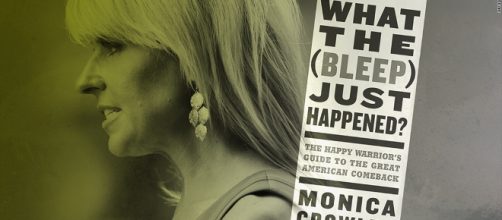Last week, HarperCollins announced that it would halt sales of Monica Crowley's 2012 book, "What The (Bleep) Just Happened", after CNN discovered the author had plagiarized material from numerous columnists and journalists. As a result of the controversy, Crowley announced on Monday that she will not be taking the position she had been offered by President-elect Donald Trump, as strategic communications director of the National Security Council.
Fifty shades of plagiarism
While Crowley did the right thing by turning down the job offer, she faced a week's worth of media flagellation for her lapse of judgment.
But one question nobody seems to be asking is this-- how on earth did a major publishing house like HarperCollins miss not one, not two, but (according to CNN) fifty incidences of plagiarism in a single book?
Let me repeat that. Fifty. As in half of a hundred. As in a pretty darn substantial percentage of the book's overall word count.
And let me repeat the name of the publisher once again-- that's the illustrious HarperCollins. Not some boutique publisher run out of the home office of a twenty-year-old NYU grad, or one of those vanity publishing houses that will create a leatherbound copy of the terrible poems you wrote when you were a sophomore in high school. We're talking about HarperCollins, a publishing house with actual employees and interns, in a big shiny building with offices and elevators and mail clerks.
The big enchilada. One of the fabled "Big Five" publishers.
Surely a company with operations in 18 countries and thousands of employees assigned Crowley an army of proofreaders, fact-checkers and editors. And yet we're expected to believe that, somewhere along the line, 50 instances of plagiarism escaped everyone's notice? There is something very, very wrong with that picture and strangest of all is the fact that HarperCollins offered no in-depth explanation-- just a short statement that they're yanking Monica Crowley's book.
Maybe I'm just outraged because I'm also an author who has had three non-fiction books published by reputable publishing houses. Not by any of the "Big Five" publishers, of course, but big enough.
And ever since I was old enough to put pen to paper I dreamed of someday being published by the likes of Random House and HarperCollins. And now, I'm not so sure I want to be.
HarperCollins has lost my respect
Most people don't realize the grueling labor that goes into writing a book. Actually, the writing itself is the easiest part. It's what goes on after the publisher decides to accept your manuscript that makes you grind your teeth to powder. My last book took about three months to write, and about fifteen months to produce. It was published by a small publisher, yet I was assigned a proofreader, editor, marketing intern and even a cover designer. Ditto for my first book, put out by an even smaller publisher.
If these companies, with one millionth of the resources as a Big Five publisher can spot one case of plagiarism, why can't HarperCollins spot fifty?
It definitely makes you wonder about the state of the publishing industry. It's like the Yankees giving a multi-million dollar contract to a juiced-up slugger, and when the slugger fails a drug test the GM has nothing to say except, "Gee whiz. How were we supposed to know he was on steroids? We just assumed he got so big and strong by drinking his milk and eating his Wheaties. It's not our fault."
Like hell it isn't. As far as I'm concerned, HarperCollins is every bit as guilty as Monica Crowley.

